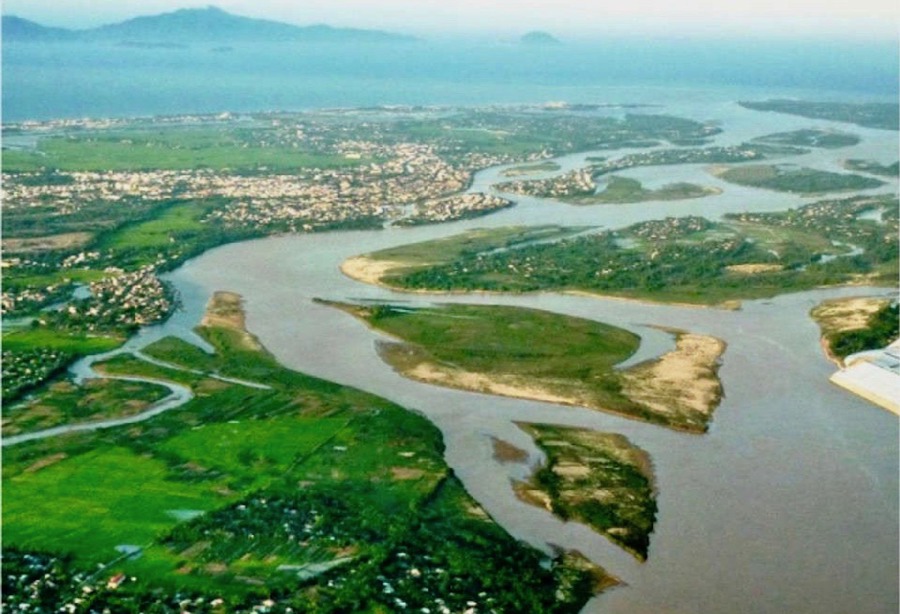Japan supports Vietnam with integrated flood management plan
Many Japanese experts have been sent to Vietnam for technology transfer.
The Japan International Cooperation Agency (JICA) Vietnam Office has signed a Record of Discussion with Vietnam's Ministry of Agriculture and Rural Development (MARD) for a technical cooperation project.
Named "Project for Flood Damage Restoration and Formulation of a Flood Prevention and Control Master Plan in the Central Region", the project aims to reduce flood risk along the Vu Gia-Thu Bon River Basin in the central region of Vietnam through three main phases.
The first phase is the installation of hydrological observation and disaster monitoring equipment. The second is risk assessment and formulation of an Integrated Flood Management Plan (IFMP) in the target area. The third is to promote cooperation mechanisms for the effective implementation of flood control measures.
The Vu Gia-Thu Bon River Basin in Vietnam's central region. File photo |
The project is scheduled to run from 2024 to 2027 with the Vietnam Disaster and Dyke Management Authority (VDDMA) as the main executing agency.
This is a technical assistance project under the cooperation between the Governments of Vietnam and Japan on natural disaster prevention, which contributes to improving Vietnam's capacity in natural disaster risk management. Therefore, the budget for the project must be based on reality.
This is among a series of projects that benefit technical and financial support from the Japanese government.
In late October, Sugano Yuichi, Chief Representative of the JICA Vietnam Office, affirmed at the FY2023 mid-term press conference that JICA Vietnam has achieved many positive results.
"This year marks the 50th anniversary of the establishment of diplomatic relations between Vietnam and Japan, so JICA is expanding the scope and diversifying the types of development cooperation. The value of ODA capital for technical cooperation projects is 4.7 billion yen (US$31.6 million) and for non-refundable aid projects is 700 million yen (US$4.6 million), with more than 100 projects being carried out," said Sugano Yuichi.
Over the past five years, a great deal of work has been done by Japanese experts and Vietnamese colleagues, including developing a method to calibrate radar data using data from automatic rain gauges, automatic weather stations and synoptic stations; building a system to improve the quality of monitoring and quantifying rain and heavy rain in an accurate way; and monitoring storms using data from radar and the Himawari satellite.
Project for "Flood Damage Restoration and Formulation of a Flood Prevention and Control Master Plan in the Central Region" promises high feasibility. The project will contribute to improving the capacity of relevant units in maintaining and adjusting meteorological monitoring equipment, processing weather radar data quality, monitoring and accurately forecasting heavy rain and storms.
The technical transfer activities to VDDMA and the Vu Gia-Thu Bon River Basin, as well as the Government of Vietnam's pre-disaster investments based on the IFMP, are expected to contribute to the realization of Vietnam's National Strategy for Natural Disaster Prevention and Control and the Resolution on Sustainable Development.
The central region of Vietnam is a complex terrain area with dense, short, and steep rivers and streams. In recent years, along with climate change, natural disasters, especially typhoons, and floods, have become more extreme and unusual, causing significant damage and loss of life and property in the region.
In the first phase, the IFMP was established in Thua Thien Hue Province. The second phase aims to strengthen capacity in planning and implementation of integrated flood management at the central government level and in targeted provinces: Nghe An, Quang Binh, Ha Tinh, and Thua Thien Hue.
To implement this project, many Japanese experts have been sent to Vietnam for technology transfer, and a large number of Vietnamese personnel have also been sent to study in Japan.
According to the World Bank, Vietnam has extremely high exposure to flooding, including riverine, flash flood, and coastal flooding. The country also has high exposure to tropical cyclones and related hazards.












